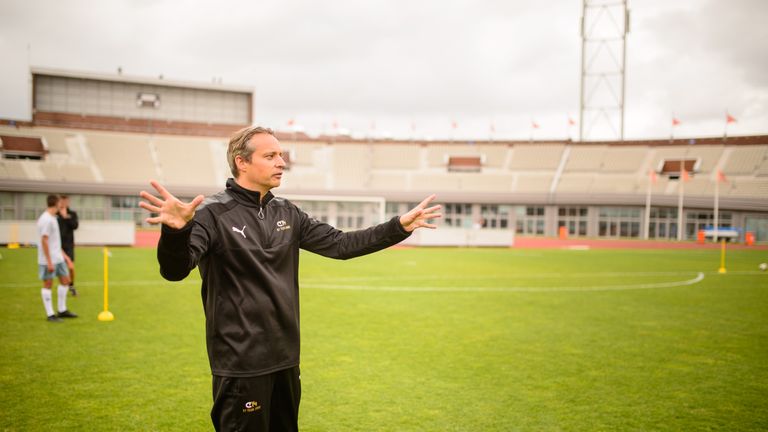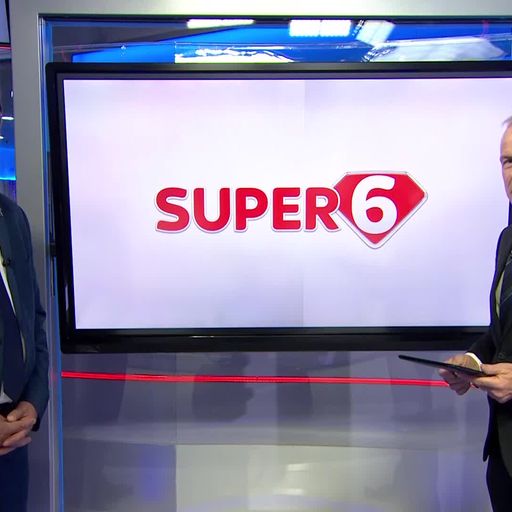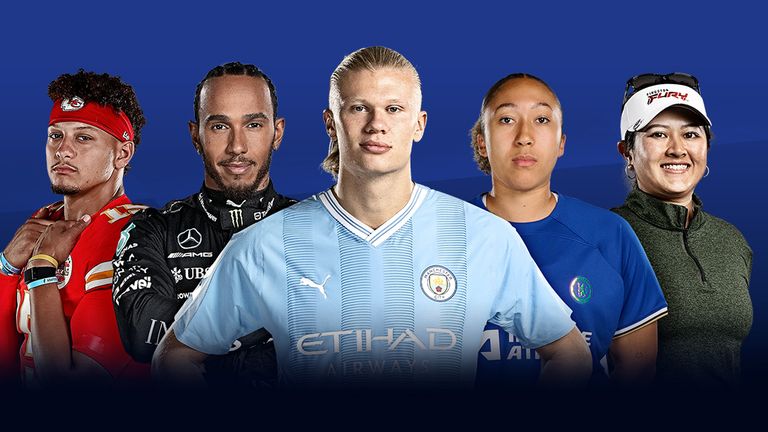Jairo Riedewald: Johan Cruyff’s guinea pig, Frank de Boer’s protégé

Monday 11 September 2017 13:28, UK
Jairo Riedewald was Johan Cruyff’s guinea pig before he was Frank de Boer’s protégé. Adam Bate speaks to former colleagues to get the lowdown on how Ajax’s unique methods helped make the player and wonders whether he’s now been left high and dry…
"I was a guinea pig. They tested everything on me." - Jairo Riedewald
It was football's velvet revolution, the culmination of a debate - and the Dutch really know how to debate - about the future of coaching at the country's biggest club. What exactly is the Ajax way? Two strands of thought emerged, subtly but profoundly different. For Louis van Gaal, the team was all. For Johan Cruyff, individual expression remained paramount.
From 2011 to 2015, despite legal wrangles and levels of acrimony rarely seen before, the Plan Cruyff appeared set to win out. His approved coaches were in place at Ajax, attempting to implement his vision. Young talent was at the eye of the storm. As one of the club's top prospects, the progress of Jairo Riedewald would serve as a referendum on its success.
Former Ajax midfielder Eyong Enoh remembers Riedewald well, particularly after he was named as the star player at an under-15 tournament. "I was the one who had to give him the trophy so I have this picture of us together," Enoh tells Sky Sports. "He was Frank de Boer's protégé. He was the one who saw him, developed him and gave him his chance."
Trending
- Liverpool on top against Real Madrid LIVE!
- Juventus continue to frustrate Aston Villa LIVE!
- Calamitous Carter-Vickers own goal gifts Club Brugge lead vs Celtic LIVE!
- Leeds in front, Swansea cruising | Five live games on Sky Sports+ tonight!
- Man Utd latest: Fans fume over 'offensive' ticket price increase
- Merson: Criminal for Salah deal to run down - but I wouldn't offer new one
- Guardiola clarifies comments over scratches on face and head
- 'Man City 115 charges hearing to conclude in December' - reports
- Transfer Centre LIVE! Saudi clubs not actively trying to sign Salah
- Man Utd vs Bodo/Glimt: Martinez in contention to return
Enoh even played alongside Riedewald for Jong Ajax, the youngster having been fast-tracked to the reserve side at just 16. In this period, it was not uncommon for the teenager to be played out of position in midfield, but not because that was the only way to fit him into the team. It was part of an orchestrated plan to further aid Riedewald's development.
"In the midfield the spaces are smaller, there are more players around you, you have less time," Riedewald himself would later explain. "If you get a ball and you have to run, you must turn short. You will benefit if you return to the back line, to the central position. I am now calmer on the ball, maybe because I am used to smaller spaces. It was a good move.
"I did not talk about it with Wim Jonk, I just heard about the thinking afterwards."
Jonk, a former Netherlands international midfielder, was the man charged with implementing the so-called Plan Cruyff at Ajax. Alongside Ruben Jongkind, he literally wrote it, transcribed from conversations with the great man. Both Jonk and Jongkind had already been working as individual coaches at Ajax and were well placed to oversee the overhaul.
Those changes were radical. Suddenly, youth coaches were expected to take charge of individual groups not teams. Winning was irrelevant. They would be moved to coach another side every eight weeks anyway. And that was just the football. A myriad of experts were introduced from other disciplines too. Riedewald, the guinea pig, embraced them all.
"We wanted to take the lessons from elite sports like track and field or individual sports such as judo into football," Jongkind tells Sky Sports. "We brought a judo world champion in. We brought in a former elite pole vaulter; an elite runner; someone from American football. They helped to improve the physical capabilities of the players individually.
"We talked about how they slept and how they ate. How they rested. Could we improve their strength and their speed in a much more focused way than in the group? We began with players who were 15 and there are many examples of players who were helped incredibly because nobody had been aware what they were doing outside of the club.
"Jairo Riedewald is a good example. He had finished school and joined the youth team, but they trained in the afternoon so he had been lying in bed until 12pm. Nobody knew this. In elite sports you have to know the 24 hour schedule of your athletes. Do you think Mo Farah wakes up and doesn't have a plan for what he is going to do until 1pm? Of course not.
"Everything should be clear. What is the plan? So the first thing we did was to say that we needed to know everything about our young players. What is their school schedule? If they are not in school then where are they and what are they doing? What do they eat at home and when do they sleep? How much more can they train?
"Instead of training four times a week, we increased Riedewald's training to nine times a week. We trained him physically much more and he then made big progress. Not just physically but in terms of his awareness. He began to think about how he could become an elite athlete. He became the boss of his own body and his own mind."
Riedewald could have been forgiven for being sceptical at first - he would not have been alone at the club if he had been. But trusted coach Bas Bruning told the youngster to give the new schedule a chance and that is what he did. Riedewald was advised to note down everything, provide the feedback and the programme would be tailored to his needs.
He has since spoken at length about the positive impact that this had on his development. Riedewald was able to find the right balance between work and relaxation, understanding at an early age how much sleep he required to perform at his best and how his body would respond under certain conditions. He made his senior international debut aged 18.
So when De Boer made the move to the Premier League, it should have been no surprise to see Riedewald follow him. While some will have seen the swift introduction of individual sleeping pods at Palace's training ground, used to facilitate double training sessions, as an unusual decision, his young defender will have known exactly what to expect.
Nevertheless, what has followed will have been a shock for player and coach. Premier League life began with a 3-0 home defeat to Huddersfield. For De Boer, it ended on Sunday with a 1-0 defeat to Burnley - sacked after only four games in charge. For Riedewald, just as happened with Cruyff's revolution at Ajax, he must continue the journey alone.
The Plan Cruyff was scuppered in 2015 with the departures of Jong and Jongkind and the passing of the man himself. But in Riedewald, the impact of his innovative work continues to be felt. Ajax reached their first European final in 21 years last May, losing out to Manchester United, with Riedewald embodying Cruyff's commitment to youth development.
De Boer's impact at Crystal Palace is pitifully small and bears no comparison. But could there still be time for Riedewald to vindicate the decision to take him to London on a five-year deal? Enoh, who made a similar move himself in 2013, trading Ajax for Fulham, believes that Riedewald's Eredivisie education will pay off in the end.
"His move to the Premier League will be challenging but I really wish the best for him because he has the basics," he explains. "Once you have the basics from Holland, which means being good on the ball and being tactically strong, you just have to work a bit on your power. But if you are intelligent you can always play in the Premier League."
Riedewald is intelligent and, having only turned 21 at the weekend, he has time to learn. If he manages to do so then there is still time too for one of the poster boys of Ajax's velvet revolution to vindicate an icon's vision. And perhaps to show too that the decision to appoint Frank de Boer as Crystal Palace was an ambitious folly not without its benefits.








